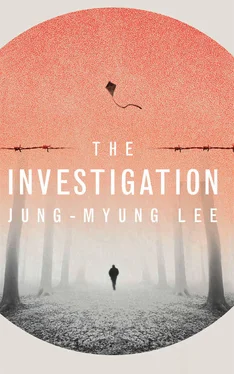To Be Incinerated.
He dipped his dry pen into the inkwell and filled out the incineration log:
Prologue ( The Sky, the Wind, the Stars and Poetry ) –
Author: Hiranuma Tochu
His hand, holding the pen, trembled. His office felt unusually cold. He put his pen down; the young man’s pale face loomed in his memory. Sugiyama hesitated for a moment. There was no need for this to be incinerated right away. He should first interrogate and punish the prisoner who wrote this seditious poem.
War dragged on. Prisoner 645 was curled up on the floor of his cell. Last summer his life had ended in a single instant, and nightmares had slammed him against the cold floor. He was no longer a university student, a young man agonizing about the times; he wasn’t spending every waking moment reading or taking long walks. Now he was ‘an element of the Korean Independence Movement’ implicated in the ‘Kyoto Korean Student Nationalist Group Incident’.
On the morning of 14 July 1943 a handful of burly men rushed into Takeda Boarding House. They were Special Higher Police detectives from Shimogamo Police Station in Kyoto. They grabbed Hiranuma’s arms as he was about to step out of the house. The detectives threw him into a holding cell at the station, but did nothing more for two days, as though they enjoyed watching someone go mad behind bars. On the third day Hiranuma was called into the narrow box of an interrogation room. Across from him sat Detective Koroki, who opened the thick file on the desk containing a police surveillance log detailing Hiranuma’s every movement during the preceding year: how many people drank how many bottles of what kind of liquor in which bar on which day, what they discussed and what time he returned home and switched off the lights.
According to Koroki, Hiranuma’s cousin, Song Mong-gyu, had been arrested with other conspirators four days earlier. Song was the alleged leader of a seditious organization, and Korean students who didn’t even know each other were linked through him. Song had made the police blacklist for his past enrolment in a Chinese officer school. The exact account of the incident, accomplices, the charge and prison term were arranged in a perfect script. The incident, later known as the Kyoto Korean Student Nationalist Group Incident, occurred when Song and Hiranuma allegedly gathered Korean students in Kyoto and plotted to fight for Korean independence and support Korean culture. The Special Higher Police detectives simply took issue with anything to do with Korea, and Hiranuma happened to be Korean. Koroki tossed a bundle of papers on the desk. Hiranuma recognized the scent wafting from his manuscript of poems — that of a warm tatami room, accidentally spilled ink, dreams that vanished into the ether — and looked down at the bundle before him.
The Sky, the Wind, the Stars and Poetry.
Scenes from his former life flashed past his eyes: the blue sky outside the windows of a lecture hall, the wind brushing tree branches on a hill, the stars filling the night sky, and the poetry he read, copied down and created.
‘Nice lifestyle you’ve got there,’ Koroki spat out. ‘Patriotic young men are dying on battlefields while you scribble poems like a little girl. Translate these into Japanese! Your poems will prove your ideology. The original manuscript will be destroyed.’ He smiled, his face crinkling like Mephistopheles.
Hiranuma gazed at the dry pen, black ink and his mother tongue. The poor-quality government-issue paper was waiting for something to be written on it. But writing his poems in Japanese was to trample on his own soul. At the same time, he was starving to write something, anything. Like a famished young man grabbing a spoon, he snatched the pen and dipped it in ink:
EASILY COMPOSED POEM
Night rain whispers outside the window
Of a six-mat tatami room in a foreign country,
Though I know a poet follows a sad calling
I write down a line of poetry,
With the tuition envelope sent
Imparting the warm scent of sweat and love
I hold a notebook under my arm
And go to a lecture by an old professor.
When I think about it
I lost
One, two, all my childhood friends.
What do I wish for?
That I alone sink?
They say life is difficult
But it is embarrassing
That this poem is so easily composed.
A six-mat tatami room in a foreign country.
Night rain whispers outside the window,
Turning on the light to drive away a sliver of darkness
My final self waits for morning, a new epoch.
I offer a small hand to myself
The first handshake of tears and solace.
After they were translated, Hiranuma’s poems were burned. He was sent to a solitary cell in the prosecutor’s office. On 22 February 1944 the prosecutor indicted him and his cousin as leaders of the incident. The trial began on 31 March, with Judge Ishii Heiyo of the Second Criminal Investigation Department at the Kyoto Regional Court presiding. Judge Ishii found the prisoners guilty of violating Clause V of the Maintenance of Public Order Act, which stated: ‘Individuals who organize an association with the purpose of changing the forms of state, support such an association, or consult, instigate or propagandize to implement such a purpose, or act in order to carry out said purpose, will be subject to a sentence of no less than one year, but no greater than ten years.’ Hiranuma received a sentence of two years. His release date was 30 November 1945, taking into account the 261 days he spent in detention prior to his conviction. He was no longer free, but he hadn’t ever known how it felt to be free; no Korean was free. Hiranuma stepped into Fukuoka Prison, counting the remaining days of his sentence.
Sugiyama opened the door to the interrogation room. He approached Prisoner 645 stiffly, wanting to appear rock-solid, and sat down across from him. 645’s lips were dry and cracked, as though they’d been salted. His thin, wrinkled red prisoner uniform, its collar threadbare, looked like a piece of dirty, cast-away cloth.
‘645! You brought this in with you.’ Sugiyama tossed a leather-bound book onto the desk. Its title, The Complete New Testament and Psalms , was embossed in gold on the black leather cover.
With trembling hands, Prisoner 645 grabbed the book and inhaled its scent of leather.
Sugiyama snapped, ‘This was allowed in only because it’s in Japanese!’
645 flipped through the book like a starving child. The thin pages of the Bible fluttered. He found the page he was looking for and read feverishly:
Blessed are the poor in spirit: for theirs is the kingdom of heaven.
Blessed are they that mourn: for they shall be comforted.
Blessed are the meek: for they shall inherit the earth.
Blessed are they which do hunger and thirst after righteousness: for they shall be filled.
Blessed are the merciful: for they shall obtain mercy.
Blessed are the pure in heart: for they shall see God.
Blessed are the peacemakers: for they shall be called the children of God.
Blessed are they which are persecuted for righteousness’ sake: for theirs is the kingdom of heaven.
— MATTHEW 5:3–10
He was a different person when he lifted his head; he was no longer haggard or nervous. His gaze was peaceful. Who had consoled him? What had brought him peace?
Sugiyama took his hand off the club by his waist. ‘Unbelievably foolish. Believing in God in times like these. ’
‘It’s better than not believing in anything.’
Читать дальше












